Kitakyushu International Techno-cooperative Association (KITA)
Mr. Kaoru Morinaga, Director of Training Division
Born in Oita Prefecture, he joined Nippon Steel Corporation (now Nippon Steel Corporation) in 1978. Since then, he has served as General Manager of the Energy Engineering Department at Yawata Steel Works, Production Engineering Department of the Head Office, and as Managing Director of Kitakyushu LNG Co.
In September 2021, he was appointed Course Leader of energy-related training courses at the Training Department of the Kitakyushu International Techno-cooperative Association (KITA), an affiliated organization of Kitakyushu City, and from June 2025, he has served as Director of the Training Department. Appointed as Director of Training Division in June 2025.
We interviewed Mr. Kaoru Morinaga, the newly appointed Director of Training Division of the Kitakyushu International Techno-cooperative Association (KITA), about his outlook for future training programs and his motto as a course leader in the energy field, which he also holds. Mr. Morinaga, who has many years of experience in the energy field, spoke with us.
Passion for Technical Cooperation: Training to Promote Issue Resolution
■As you take on your new role as Director of the Training Division, can you tell us about your thoughts on technical cooperation?
The participants from overseas come to Japan with a strong sense of purpose to contribute to the promotion of energy policies in countries aiming to decarbonize their economies.
Although they come from very different countries and have very different expertise, they will spend more than a month learning about Japan's energy policies, technologies, and best practices, discussing the realities of their countries, and finding solutions to their problems. We believe that the important role of the training program is not simply to acquire knowledge, but also to provide a process to seek and plan solutions on their own, and to offer subjects that will serve as hints.
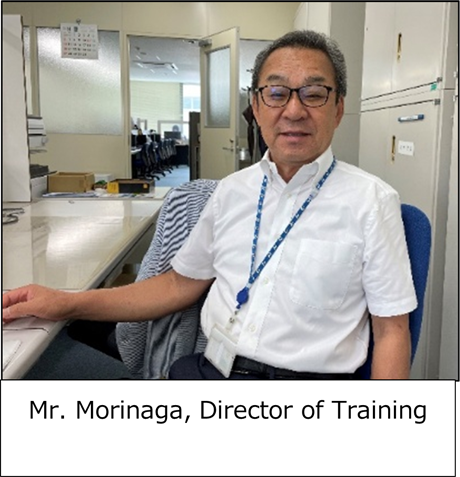
“Let's try it, maybe we can do it!” Confidence in participants.
■You also serve as a course leader for training courses. Could you tell us about the motto that you value in this position?
Even after returning to their home countries and recognizing the role they should play and finding specific issues to be addressed, participants share common concerns, such as organizational barriers, budget problems, manpower, and so on. KITA's course leaders have many years of experience working successfully in various fields with the same concerns, so they can talk with participants through their own experiences and give them tips on how to create a plan to accomplish their tasks according to their own sense of the challenges they face.
Of course, these are only hints, and it is up to the participants to make action plans and implement them, but the most important value of the training program is that through the process of making action plans, the participants return home with the awareness of “Let's try it” and “Maybe I can do it,” and I will continue to fulfill my role as course leader with the same awareness.
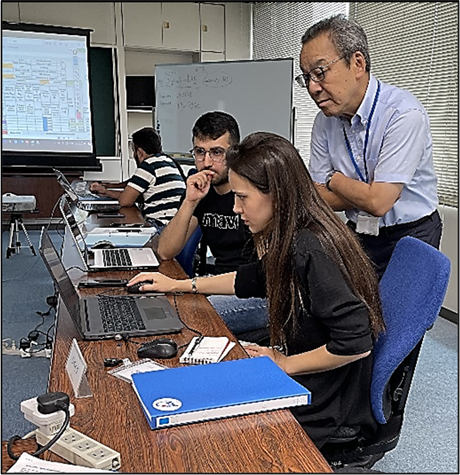
Lecture Practice
Experience at Nippon Steel Corporation will be utilized for training.
■You have had a long career at Nippon Steel Corporation. How has your experience there influenced your training duties?
As a steel energy engineer, I have been involved in energy policy and technology department and challenging to create energy business for many years. I also spent time in the United States in the 1990s to help improve energy efficiency in a steel mill in U.S. These experiences have served me well in my work as a course leader, which I mentioned earlier. Especially, I really enjoy talking (sometimes with drinking) with the young overseas participants in the overseas training programs. By talking about what I tried to do at work, what I achieved, and my experiences of failure, I am very happy when the participants become aware that they can try and that they might be able to do it.
Strengths of Kyushu Technology: Kitakyushu's Achievements as an "Environmental Energy City
■As for technical cooperation in training projects, what do you think are the unique strengths of Kyushu's technology?
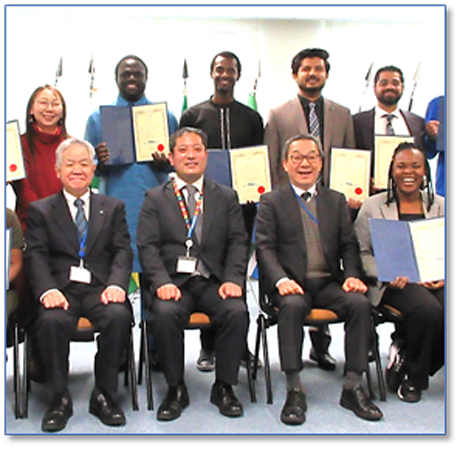
Closing ceremony of the training
A participant from a bank that invests in infrastructure in a certain country gave an excellent presentation during last year's energy conservation course. He insisted “I would like to propose in my country the demonstration and realization of a concept that combines the current problems of pollution in my country, the realization of a recycling society, energy conservation in industry and the city, and a new energy supply system. I believe that this is a theme that our country should address immediately after seeing with my own eyes and listening to the many examples of how Kitakyushu has overcome various problems associated with industrial development through public-private cooperation over the past 60 years.”
The main purpose of the training program is to gain knowledge of individual technologies and policies, but I realized that one of the great strengths of Kyushu, and Kitakyushu in particular, is that the participants were able to experience firsthand the history of the realization of the environmental energy city policy, listen to the thoughts of people, and observe actual examples that will provide hints for the participants to develop a major concept for their own country. I realized that this is one of the great strengths of Kyushu, especially Kitakyushu City.
Evolution of the Training Program: Toward Flexible Programs Tailored to Your Needs
■How do you feel that the “energy conservation” and “renewable energy” training programs should evolve in the future?
Having overseen the energy conservation course for two years and the renewable energy course for three years, I feel two things.
One is that for participants in charge of national energy administration, the promotion of energy efficiency and conservation and the promotion of renewable energy are policy issues that should be considered in a comprehensive manner. Japan's energy conservation policy has been divided into two categories of training program, perhaps because the policy started with energy conservation in industry, followed by energy conservation in consumer and transportation sectors, and in recent years, the policy has been developed to include the introduction of renewable energy.
However, for each country, the choice and priority of energy conservation and renewable energy policies differ according to the development of its own industry, energy supply and demand structure, and electricity supply and demand structure. It may be the logic of the training provider to conduct the training as a separate course for energy efficiency and renewable energy policies.
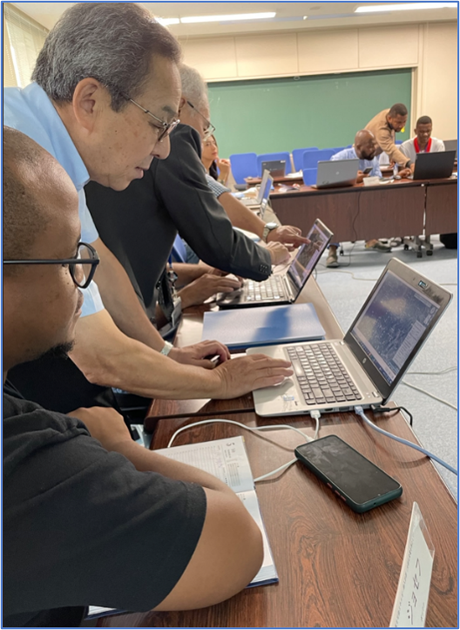
Lecture Practice
Another point is about courses on renewable energy, especially photovoltaic power generation (PV). Certainly, there are participants from countries that have introduced PV more than Japan, but there are also many countries that are in the beginning stages of introducing PV, and some are considering it as a measure to electrify rural areas. There are also several participants who are working for government agencies in project development and operational management practices.
For participants in each country, where there are differences in the progress of PV installation and the reality of their work, the most effective information for solving problems would be to study the solutions that Japan has adopted to the problems that have arisen in response to the progress of PV, and to select the best solution for each country according to the actual situation in each country.
We feel that the challenges that Japan is currently facing (e.g., in terms of grid interconnection) are not the same challenges that the participants in each country have.
Considering these two points, it would be better to reorganize the current training design, which categorizes “energy conservation course” and “renewable energy course” with policy and technology contents respectively, into two courses.
One is for energy policy makers who must have a bird's eye view of overall energy policy in charge of energy efficiency, conservation and promoting renewable energy. Second is a course for technical personnel who are involved in the development, operation and management of energy conservation and renewable energy projects, as well as technology development and standardization, which provides technical information related to energy efficiency, conservation and renewable energy.
I strongly believe that it would be better to provide training programs with more clear objectives for the participants from each country.
Message to Returning Participants
■Finally, do you have any message or words of encouragement for the participants who have returned to their home countries?
I hope that you will realize the ideas and thoughts you have during your participation in the training program, and I am sure that you will make a great contribution to your country. I hope that your participation and experience at JICA Kyushu will help you to have a fruitful life.
(Interviewer: Ms. Ogawa, Training Program Division)
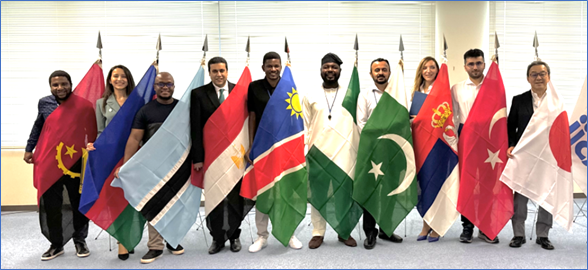
Mr. Morinaga and Participants with their national flags




scroll